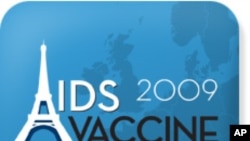A major AIDS vaccine conference is underway in Paris, and Tuesday researchers took a closer look at the recent Thailand vaccine trials.
The annual event is sponsored by the Global HIV Vaccine Enterprise.
Dr. Seth Berkley, head of IAVI, the International AIDS Vaccine Initiative, says, "In all of the other AIDS conferences there are vaccine sessions, but this is a conference that is just based upon vaccine science."
Thailand trials getting lots of attention
A few weeks ago, the trials received a lot of attention because they showed a two-vaccine combination provided some protection for humans against HIV, the AIDS virus. But shortly after, a follow-up report said that the results might not be as promising as first thought. That stirred controversy over the trials.
"When the results were first reported, what they showed was an efficacy rate of 31 percent…just over statistical significance," he says.
Berkley says the controversy occurred because "after the data was announced it was learned that there were other analyses that were not statistically significant. At this conference, all of the data was laid out…and the initial analysis, which was released, was the most appropriate to look at for outcomes of this trial."
The vaccine combo provided a "modest effect," he says.
<!-- IMAGE -->"It's significant because this is the first time that scientifically we've shown protection in humans. We've always suspected it. We know that humans can make the right kind of immune responses, but this is the first that we actually have a protection in humans."
Why modest?
"I say modest because the effect was 30 percent, which is a relatively low efficacy for a vaccine. You like to see a vaccine to have a public health effect a higher efficacy," says Berkley.
The Paris summit is also looking at the latest research on what's called neutralizing anti-bodies. These are produced by the immune system to fight off bacteria and viruses. IAVI researchers had published a report on that matter earlier.
"Today (Tuesday) another broadly neutralizing antibody was announced by the vaccine research center at NIH (National Institutes of Health)…. What this shows is that the science investments that have occurred over the last few years are really beginning to pay off now," he says.
Scientists, he says, will have "lots of new tools."
Berkley founded IAVI 12 years ago in hopes of discovering an AIDS vaccine.
"We had really hoped that a vaccine would occur quicker, but we had to run a lot of different approaches and realized that we had to come back and solve some of these basic science challenges, like neutralizing antibodies."
He says there's been a Renaissance in AIDS vaccine development.
"In a sense, it's a really, really, exciting time right now."
<!-- IMAGE -->








